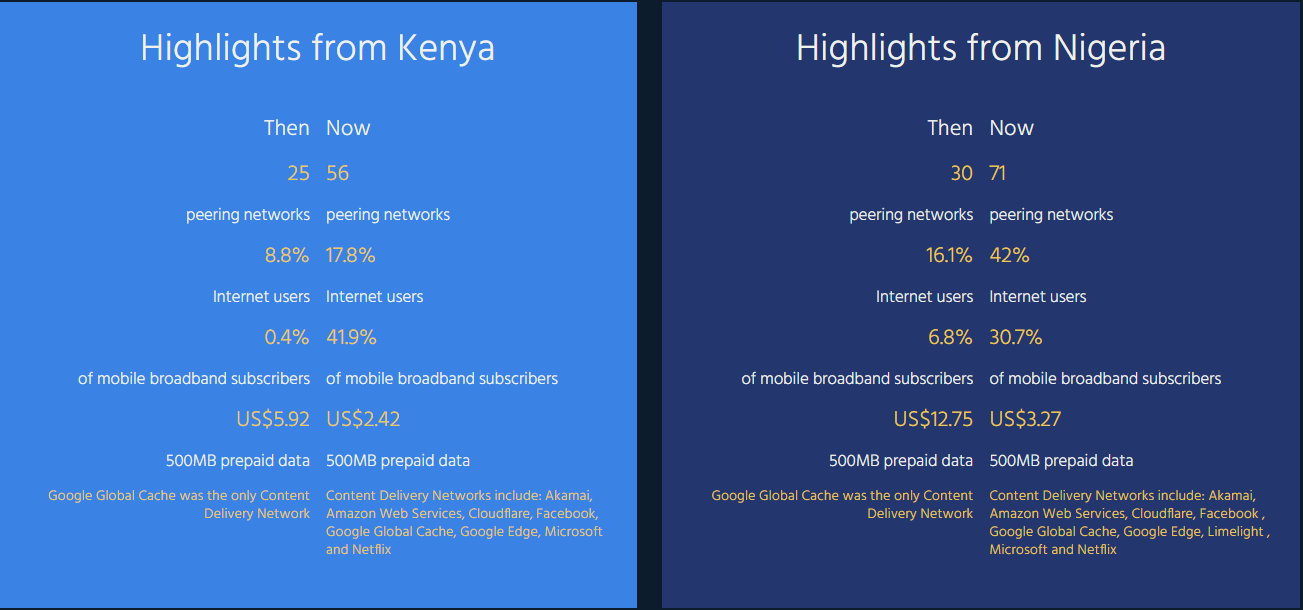Local IXPs will result in faster and cheaper internet for African countries
Nigeria and Kenya are now in the second stage of internet ecosystem development, according to the Internet Society. And they are on the cusp of achieving stage three.

Nigeria and Kenya are now in the second stage of internet ecosystem development, according to the Internet Society. And both countries are on the cusp of achieving stage three development.
The second stage of internet ecosystem development is characterized by increased localised internet traffic. Ten years ago, the Internet Society (ISOC) envisioned that 80% of African internet traffic would be localised by 2020.
However, nearly 70% of internet traffic in both countries are now localised. This has resulted in lower latency. And it has given Nigerians and Kenyans access to relatively affordable and faster internet.
Most of the content and internet traffic in both countries now go through local exchange points (IXPs). These are the Internet Exchange Point of Nigeria (IXPN) and the Kenya Internet Exchange Point (KIXP). International content is also available locally because content delivery networks (CDNs) are setting up Point of Presence on the continent.
A case in point is the streaming of Eliud Kipchoge 1:59 INEOS Challenge. Because of Google Point of Presence (PoP) in Kenya, millions of people were able to watch the live stream on Youtube. According to Safaricom, which offered free data bundle, over three million people subscribed to the 159 Youtube data bundle. Youtube also recorded its highest traffic in Kenya on that day, October 12, 2019.
> **Related Artile:** [Right of Way charges have been baulking broadband penetration](/broadband-right-of-way-ng/)Some eight years ago, however, it would have been difficult for millions of people to watch the live stream. ISOC explained the internet "simply wouldn’t have been fast enough to keep up, or been accessible to many people".
The role of Internet Exchange Points in providing faster and less expensive internet
IXPs are like a rendezvous where networks exchange traffic. Without IXPs in Africa, internet service providers (ISPs) would have to use their international internet protocol transit to exchange global internet traffic, local traffic, and access content hosted abroad.
By enabling local traffic to remain local, IXPs lower the cost and latency of exchanging internet traffic and accessing content.
In 2012, only 30% of traffic in Kenya and Nigeria were localised. That was the first stage of internet ecosystem development. Both countries, according to ISOC, had a strong base of growth. Both had static international content available via a Google Global Cache. But there was no locally available content because they were hosted abroad.
Thus, eight years ago, the peak IXP traffic in Kenya was 1Gbps and 500Mbps in Nigeria. KIXP and IXPN were only able to help ISPs save $1.4 million and $1.08 million, respectively.
Today, however, the ISOC reported that Nigeria and Kenya are near stage three of internet ecosystem development. To fully achieve stage three, however, local content must be developed and hosted locally. The 2020 report is titled, "Anchoring the African Internet: Ecosystem: Lessons from Kenya and Nigeria’s Internet Exchange Point Growth".

According to the ISOC, the peak traffic of KIXP in 2020 is 20Gbps. It has also grown from 25 peering networks in 2012 to 56 peering networks in 2020.
Similarly, IXPN peak traffic is now 125Gbps. Its peering networks include international content providers such as Akamai, Facebook, Google, China Telecom, Glo, and Main One.
According to the ISOC report, West African Internet Exchange (WAF-IX) launched in Lagos two years ago. Its primary goal is to help content providers deliver content from their PoPs in Nigeria throughout the West African region. It is an initiative of Main One. And with the support of Asteroid, WAF-IX would leverage the submarine capacity of Main One to add future nodes in Ghana, Ivory Coast, and Senegal.
Senior Director of Internet Technology and Development for the Internet Society, Michuki Mwangi, said: "Kenya and Nigeria are in a better position than ever before to cope with – and contribute to – the digital revolution that COVID-19 has accelerated as the internet becomes a lifeline for many people.
"It’s clear Africa is ready to embrace the digital revolution to spur economic development. But reaching this goal will depend on our community of passionate people on the ground, policymakers, regulators and businesses embracing IXPs and working in collaboration to create these essential local traffic anchors".
The ISOC is a global non-profit working to ensure the Internet remains a force for collective good of everyone. It was founded in 1992 and have over 130 chapters around the world.
What Kenya and Nigeria must do to achieve stage three of internet ecosystem development
To move forward into Stage 3 of development, in which more than 70% of traffic is localized, will require several further developments:
- Local content developers, including the government in some cases, who are hosting their content outside the country, will need to bring it ‘home’ to increase local traffic.
- Smaller ISPs in the countries will need to connect to the IXPs to increase the efficiency of their interconnections.
- Domestic infrastructure will have to be extended beyond the main landing point for submarine cables and into the other major population centres.
What other African countries can learn from the success of Nigerian and Kenyan IXPs
The report concluded that other African can learn from the experience of Nigeria and Kenya.
It said both countries have made tremendous strides since 2012 towards a strong healthy, internet ecosystem, and they are reaping the rewards. Other African countries can:
- Leverage the relationship between IXPs and carrier-neutral data centres. IXPs tend to come before data centres and can help facilitate their development
- Ensure sound governance of the IXP. This is crucial to effectively manage the IXP’s future membership, traffic, and node growth.
- Create economies of scale to lower costs. Large international content providers have the scale to extend their networks into multiple countries. This provides significant benefit for the ISPs and their subscribers in those countries.
- Increase awareness among small ISPs and local content providers. Local content providers and smaller ISPs often lack the awareness to take advantage of the benefits of an IXP and the scale to do so efficiently.
- Enable aggregation. Once awareness is built, a number of possible avenues for aggregation emerge. For instance, content hosting and building capacity in and between cities.
- Government action to broaden the market. The government can make the local ecosystem more attractive to smaller ISPs and content providers by lowering costs and increasing demand.







Comments ()